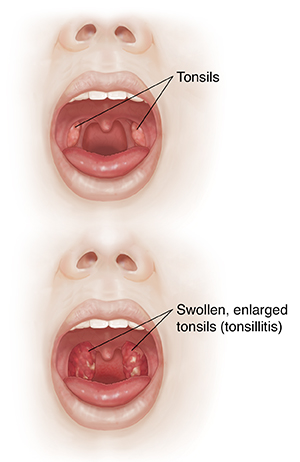Tonsillitis in Adults
Tonsillitis is swelling and redness (inflammation) of the tonsils. It happens when the tonsils are infected by a virus or bacteria. Your tonsils are 2 pink, oval lymph glands at the back of your throat. They are part of your immune system. This system helps your body fight infection. Tonsils react when germs get inside your nose and mouth.
Tonsillitis is very common. It is most often seen in children, but it can also occur in adults.
The viruses and bacteria that cause tonsillitis can be easily passed from one person to another.

What causes tonsillitis?
Tonsillitis is most often caused by a virus.
Common viruses that cause tonsillitis include:
-
Cold viruses
-
Adenoviruses
-
Epstein-Barr virus
-
Infectious mononucleosis
-
Herpes simplex virus
-
Cytomegalovirus
-
Measles
In some cases, tonsillitis is caused by bacteria. Bacterial tonsillitis is often called strep throat. The most common type of bacteria that causes tonsillitis is Group A beta-hemolytic streptococcus. The bacteria are spread through droplets in the air. This happens when someone with the infection coughs or sneezes. It can also be spread by sharing food or drinks.
Symptoms of tonsillitis
Symptoms will depend on which type of tonsillitis you have. There are several types of tonsillitis.
Acute tonsillitis
Symptoms for this type of tonsillitis often go away in a few days. But they can last up to 2 weeks. In some cases, symptoms come back after treatment is done. This is called acute recurrent tonsillitis. Symptoms include:
-
Fever
-
Sore throat
-
Bad breath
-
Trouble swallowing
-
Fluid loss (dehydration)
-
Sore lymph nodes in the neck
-
Tiredness
-
Snoring, sleep apnea, or breathing through the mouth
-
White patches, pus, or red tonsils
-
A red rash on the body
Chronic tonsillitis
The infection or inflammation lasts for a few months for this type. Symptoms include:
Peritonsillar abscess
This is a severe form of tonsillitis. It occurs when a pocket of pus (an abscess) forms around the tonsil. You need treatment right away. This can help stop the abscess from blocking your airway. Symptoms include:
Diagnosing tonsillitis
If you have symptoms, see your primary healthcare provider. Or see an ear, nose, and throat healthcare provider (ENT or otolaryngologist).
The provider will ask about your symptoms. They will also check your ear, nose, and throat for any swelling and infection. The provider will then swab your tonsils or the back of your throat. This sample can be checked in the provider’s office for strep throat. This is called a rapid strep test. Results are ready in a few minutes. But there can be false negatives with this test. If there is a question about the results, the provider will also send the sample out to a lab for testing (throat culture). The lab results will take 24 hours or longer. But a throat culture is more accurate.
Treatment for tonsillitis
Treatment will depend on what is causing the tonsillitis. If it’s caused by bacteria, then your provider may prescribe antibiotics to help you recover. Finish all of the medicine even if you start to feel better.
Antibiotics don't work to treat tonsillitis caused by a virus. This kind of infection often goes away on its own. Home care may be all that you need. Rest and fluids can help too. Follow these tips to help ease your symptoms at home:
-
Get plenty of rest.
-
Drink lots of fluids, such as water, soup, broth, and tea with honey and lemon.
-
Eat soft foods, such as ice cream, applesauce, and flavored gelatins.
-
Gargle with warm salt water.
-
Use over-the-counter throat sprays or lozenges for throat pain.
-
Take over-the-counter medicine for fever and pain, as directed.
-
Use a cool-mist humidifier to keep the air moist.
In severe cases, a person may be dehydrated or have a blocked airway. They may need to be hospitalized.
Surgery to remove the tonsils (tonsillectomy) may be needed if you have any of these:
If you have a peritonsillar abscess, surgery may be done to drain the abscess.
Preventing tonsillitis
Tonsillitis itself can’t spread. But the virus and bacteria that cause it can be passed to other people.
No vaccine or medicine can prevent tonsillitis. These tips can help keep you from spreading or catching an illness that can cause tonsillitis:
-
Stay away from anyone who is sick as much as possible.
-
Don't share utensils, drinking glasses, toothbrushes, or other personal objects with anyone who is sick.
-
Wash your hands correctly. Wash them often with soap and clean water for at least 20 seconds. Use hand sanitizer with at least 60% alcohol when you can’t wash your hands.
-
Cover your mouth when you cough or sneeze.
Call 911
Call 911 if any of the following occur:
When to call your healthcare provider
Call your healthcare provider if any of the following occur:
-
Fever of 100.4°F (38°C) or higher, or as directed by your healthcare provider
-
A lump that gets larger
-
Worsening throat pain or neck pain
-
Unable to open your mouth fully. This is called lockjaw or trismus.
-
Neck stiffness
-
Bleeding
-
Painful swallowing
-
Feeling very sick
-
Sore throat for more than 2 days